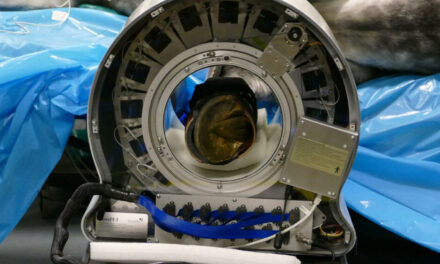(first appeared in the September 2013 issue of The Equiery)
by Lauren Fisher
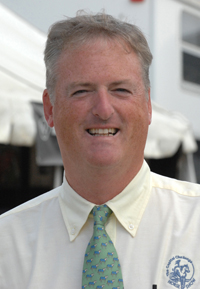
Show managers Oliver Kennedy (pictured) and Billy Glass hosted the first official Capital Challenge Horse Show in October 1994. ©Isabell J. Kurek
The Capital Challenge Horse Show (CCHS) celebrates 20 years of renowned competition at Prince George’s Equestrian Center this year as many of the nation’s top competitors return to Upper Marlboro in October. Capital Challenge has grown tremendously since its inception and the 20-year milestone is an exciting one for horse show managers Oliver Kennedy and Billy Glass. Working together, the pair has seen their innovative ideas and dedication turn out one of the country’s premier indoor competitions.
When Prince George’s Equestrian Center broke ground in 1993, Kennedy and Glass had a vision to create a top competition that would lead the indoor show season in North America. Kennedy reserved the dates in advance and ran a warm-up show in the brand-new Show Place Arena that December. Kennedy and Glass hosted the first official Capital Challenge Horse Show in October 1994.
A Successful Start
A success right from the start, the Capital Challenge Horse Show has grown immensely over the years. The show started out as a five-day competition with around 500 horses and has expanded to nine days and over 1,000 horses. There is a long wait list of competitors each year who hope to earn a coveted spot to compete.
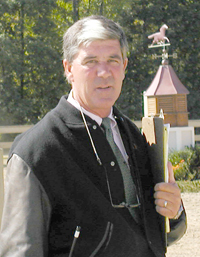
“We have so many good quality horses and that is what attracts the people,” said show manager Billy Glass. ©Michelle Bloch
Along with the competitors came many businesses, groups and individuals who supported the show from the beginning. Ariat International, for instance, is the longest-running corporate sponsor of the show. They sponsored the grand prix that was held the very first year and this will be their 20th year of sponsorship at the horse show.
Capital Challenge is the premier indoor show because of the support of its many dedicated exhibitors. Three-time World Champion Hunter Rider (WCHR) champion Peter Pletcher was one of the show’s first sponsors and has been a huge supporter for all 20 years. Many of the industry’s best equestrians from across the country jumped on board in the show’s first years as they learned of the exciting plans for this new competition.
In the first years of the horse show, the community of Upper Marlboro saw a booming economic impact that has continued to grow. Along with the lucky competitors who earn the opportunity to attend the show each year come trainers, owners, grooms, family and friends. Hotel rooms book up fast, local restaurants and businesses get ready for a huge increase in patrons and local vendors prepare to show their wares at the event. Local companies are used for tent and temporary stabling rentals as well as the purchase of flowers and plants to decorate the rings and show grounds.
An economic impact report in the third year of CCHS showed an $11 million boost to the city during the event, which was only six days at the time and hosted only 725 horses. Kennedy estimates that the figure has greatly increased as numbers have grown and days have been added. In 2012, 1,764 room nights were booked at the eight partner hotels of the CCHS through Equestrian Travel. This number does not even include those who booked hotels on their own or at other nonpartner hotels.
Looking Back & Springing Forward
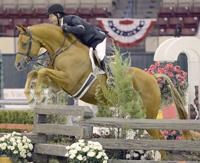
Longtime Capital Challenge competitor and sponsor Peter Pletcher won the 2012 $25,000 WCHR Professional Challenge with Sambalino. ©Shawn McMillen Photography
Both Kennedy and Glass have broad backgrounds in the equestrian business and have years of experience running horse shows, but for them, the success of Capital Challenge has been monumental. This year will be a celebration of all of the people and horses who have made the show special.
Kennedy and Glass each recently recalled some of their favorite fantastic moments over the years. Kennedy will never forget the moment in 1997 when Rick Fancher and Osczar, owned by Dawn Fogel, made hunter history by scoring the first-ever perfect 100 in a Regular Working Hunter class.
“That was a real standout moment,” Kennedy remembered. “It was the first time anybody had ever gotten a score of 100. I didn’t even see the round; I saw it later on a video. Billy and I were by the outside ring and all of a sudden everybody came running up the ramp. Then everybody ran back in because that was Rick’s first round and they wanted to see what he scored in the second round.”
“Most of my favorite moments tend to sportsmanship and competition,” Glass noted. “One of my fondest memories is watching Jack Towell applauding for Scott Stewart after he won over Liza (Towell) Boyd in the Pro Finals. I thoroughly enjoyed that.”

Molly Sewell was the Ariat National Adult Medal winner in 2001 and then went on to top the World Championship Hunter Rider Emerging Professional Challenge in 2010. ©Jennifer Wood Media, Inc
“The whole basis of success for CCHS is the level of competition and bringing everyone together to compete,” stated Glass. “We host many of the best horses and riders in the industry and we are lucky that we have a great facility to attract them. People come from California, the Midwest, the Southwest, year in and year out. We have the highest level of hunter competition.”
“Once we got to 1997 and beyond, people were looking at it like it was an actual indoor show and embracing it that way,” Glass said of the show’s early development. “We offer the best conditions for the horses. We have a history of extremely high-level competition, so the numbers have taken care of themselves. Winners compete at Capital Challenge. I must say, since the beginning we have seen the most amazing quality of horses. Every horse that comes there is capable of placing; I think that is the basis of our success. We have so many good quality horses and that is what attracts the people. They don’t want to do it every week, but once a year they want to prove they’re the best of the best.”
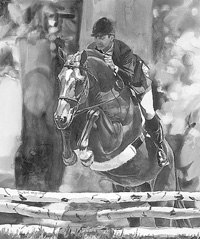
Rick Fancher and Osczar were the subjects of a painting by Michael Tang after they put in a perfect 100-point round in the 1997 Regular Working Hunter class. ©artwork by Michael Tang
Through the years, Kennedy had some innovative ideas to draw in the competitors. In addition to the regular lineup of hunter/jumper classes, the show began adding new equitation finals, exciting new hunter championships, and new divisions for the exhibition of young horses.
The divisions and classes have evolved over the years, and what they have now are some of the nation’s most popular events. From the Developing Pro Rider Challenge and Future Hunter divisions for young horses, to the ARIAT National Adult Medal Finals and THIS National Children’s Medal Finals, along with the World Championship Hunter Rider (WCHR) Professional Finals, Capital Challenge boasts a strong schedule of prestigious classes.
As the Capital Challenge Horse Show looks forward to its 20th year, the goal is now to keep the best of the best coming to Upper Marlboro each fall and to keep the competition fresh and original. Kennedy is not sure what the future will bring, but he plans stay ahead of the curve.
“When we originally started the show, Billy and I decided that we wanted to do a show the way we thought it should be done,” Kennedy stated. “We didn’t want a cookie cutter horse show. We didn’t want it to be just like the next week or the week before. We wanted ours to stand out and I think the hardest thing is to stay current and keep your ideas fresh. I think our horse show spearheaded a lot of change in the industry and now the most important thing is staying ahead of the curve and fresh with new

